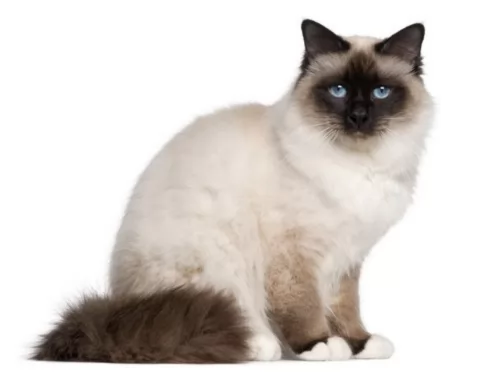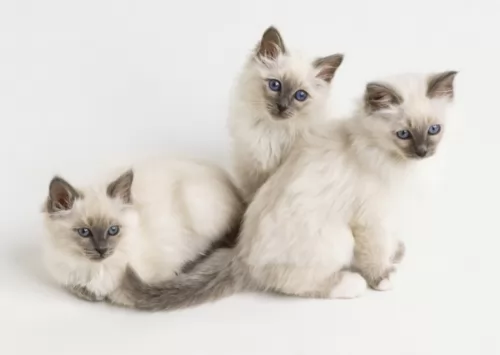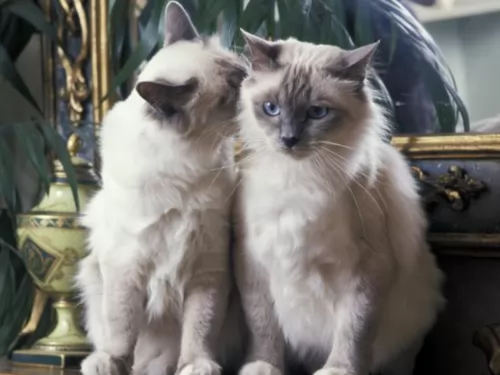 Petzlover
PetzloverBirman is originated from France but Red Point Siamese is originated from United Kingdom. Both Birman and Red Point Siamese are having almost same weight. Birman may live 5 years less than Red Point Siamese. Both Birman and Red Point Siamese has same litter size. Birman requires Moderate Maintenance. But Red Point Siamese requires Low Maintenance
 There isn’t clarity as to this exquisite cat’s origins. Many people believe they originated as the companions of temple priests in northern Burma.
There isn’t clarity as to this exquisite cat’s origins. Many people believe they originated as the companions of temple priests in northern Burma.
The cats somehow found their way to France, and it is believed that they have been in France since the 1920s.
The cats nearly disappeared during World War II, but luckily the remaining Birmans that survived were crossed with Siamese and Persians to strengthen the breed. In the early 1950s, pure Birnam litters were produced. It was in about 1959 that Birmans were brought to the United States.
The cats were also recognized in Britain in 1965 and in 1966 by the CFA. The first Birman cats were seal point but later other colors were brought in such as red, chocolate, and tabby.
The Siamese cat remains one of the most famous among the cat breeds. The Red Point is also known as the Flame Point Siamese cat. This breed of Siamese is rare.
It is believed that when the seal point Siamese breed was first introduced to the U.K in the 1930s they were bred with cats that carried these orange genes such as the tabby or tortoiseshell British shorthair cats.
Breeders wanted to produce a Siamese-style pointed cat in colors other than the traditional shades,
 These are medium-sized cats which can become fairly large. They can weigh up to 4, 5 or 6kg. They are fairly heavily boned with a broad face and ears that are widely spaced.
These are medium-sized cats which can become fairly large. They can weigh up to 4, 5 or 6kg. They are fairly heavily boned with a broad face and ears that are widely spaced.
The round eyes are deep blue. The cat’s fur is medium-long and should be silky to the touch with no undercoat. Ther cat is a moderate shedder.
The base color is whitish to cream, but the kittens are always born white. Coat color, whether red, cream, or chocolate is always pointed and the cat always has the white paws.
The Birman isn’t as outgoing as some of the other cat breeds and its a quiet, docile intelligent cat that attaches itself to one particular family member. They can actually become jealous of their human companion and demand their attention.
These friendly cats are wonderful choices for families with children and dogs. They are calm and affectionate, and softly spoken, quietly letting you know when it’s dinner time and enjoying just being around his human family.
He is able to get along well with kids and other pets in the home. He can become quite playful too and because he is so intelligent, you can buy him some toys that require him to think.
These cats are medium-sized, muscular cats and can weigh between 3 and 6kg. The neck is fairly long, the legs long and lean too.
These attractive cats have got reddish-gold points and with their sparkling blue almond-shaped eyes they really are a beautiful breed of cat. Like other Siamese kittens, the Redpoint kittens are also white when they are born. Variations of the Red Point Siamese cat should always have creamy-white bodies with the reddish-orange points.
The coat is short, thick, and silky. The points start emerging later on and deepen as the cat matures. You may see reddish freckling over the face, legs and paws as well as the tail.
The Redpoint Siamese is playful, social, friendly and intelligent. They love nothing more than to be around their human family but don’t warm too well to strangers.
They tend to become possessive over what they feel is theirs. They are also very vocal and have a different meow to express their feelings. These are definitely cats that don’t like being left alone for long periods of time. They want to be occupied and entertained and will need lots of stimulating toys to keep them occupied and exercised.
 The Birman cat has to be one of the most beautiful cats there are, but the cat isn’t only a beautiful cat, it has wonderful characteristics as well.
The Birman cat has to be one of the most beautiful cats there are, but the cat isn’t only a beautiful cat, it has wonderful characteristics as well.
It is a loving, affectionate cat with his human family, loving to spend time around them. Playful and healthy, when you bring this most wonderful cat into your home, it will be as though an angel has come to stay.
If you’re looking for an exceptionally affectionate cat, then the Red Point Siamese is full of personality and will suit you very well as these cats are remarkably affectionate.
They always take an interest in what their humans are getting up to. They’re capable of forming strong bonds with their human family. They are also curious and intelligent and they can be taught a few tricks too.
They’re good-natured with their own human family but are not friendly with strangers.
They’re also energetic and agile and love to leap up onto a perch or your shoulders and survey his world from there.
If you want a cat that is an involved member of your family and an awesome companion, the Red Point Siamese will fit into this category superbly well.
 With good health your Birman can reach up to 13 years of age. With the Birman, the most serious illness is feline hypertrophic cardiomyopathy which also happens to be the most common heart disease in cats.
With good health your Birman can reach up to 13 years of age. With the Birman, the most serious illness is feline hypertrophic cardiomyopathy which also happens to be the most common heart disease in cats.
It’s a progressive disease and can result in heart failure. The cats are also at risk of developing feline infectious peritonitis.
Also, because this is a larger cat and a stocky kind of breed, it can easily put on weight and then become overweight. Strict attention will need to be given to diet as well as daily exercise.
Also, look out for Corneal dermoid - skin and hair on the surface of the cornea in one eye or in both. Luckily this is an eye problem that can be surgically corrected.
The Red Point Siamese isn’t going to have any more cat diseases than any other cat. Any cat stands a better chance at good health when they have an exceptionally healthy diet.
Have your cats neutered or spayed to prevent unwanted kittens and to promote better health for your cats.
Watch out for diseases such as Progressive retinal atrophy (PRA), a genetic eye problem where the cells deteriorate. The disease, though not painful, can lead to blindness.
Obesity in cats, but particularly a slim, athletic cat such as the Red Point Siamese, can bring on a host of health issues. Overfeeding your cat isn’t a form of love but an irresponsible act. There are just too many dangers linked to being overweight to ignore. Excess weight can lead to joint problems as well as diabetes, and just getting rid of a little bit of weight can already result in increased overall good health.
Cat experts tell us that excess weight can shorten your pet’s life by 2 years. Get some tips on feeding your cat and keep him playfully active as well.
 The Birman has a silky coat that sheds moderately so you want to give him a gentle brush once or twice a week to keep the coat of his soft and silky.
The Birman has a silky coat that sheds moderately so you want to give him a gentle brush once or twice a week to keep the coat of his soft and silky.
The Birman has a full topcoat, with no undercoat which means that you won’t have the coat matting or tangling.
He’ll need his nails trimmed and his teeth checked regularly. Your vet or professional groomers can do this for you and clean his teeth and check that there are no bad teeth making your pet sick.
The Birman cat has access to some great commercial cat food as there are some seriously good quality ones.
Many cat lovers choose cat foods that are AAFCO (Association of American Feed Control Officials) approved. It at least provides minimum standards for pet foods.
For your Birman you want to avoid artificial flavors and preservatives. Choose quality foods high in meat protein. As a carnivore, a cat has a huge need for meat protein. Get to know your pet food labels and choose foods with added taurine and vitamin A.
With good care these cats cat reach 15 – 20 years of age.
The Red Point Siamese cat does shed but because it’s a low shedding cat, it becomes low maintenance. They usually shed in spring and again in the autumn. The short, easy-to-care-for coat can be brushed once a week.
Cats are strict carnivores, and just as a wild cat feeds on animal protein, so it is with a domesticated cat. They require a host of nutrients and only the best, high-quality foods contain these nutrients.
You get dry, semi-moist, and canned cat foods and the best commercial cat food manufacturers ensure that these foods have all the right balances of nutrients a cat needs.